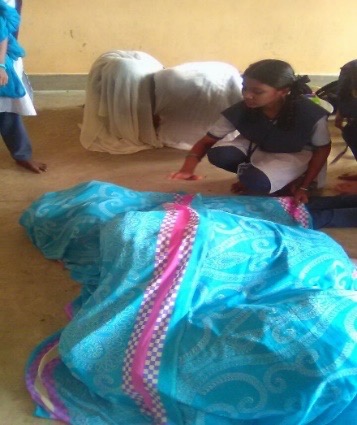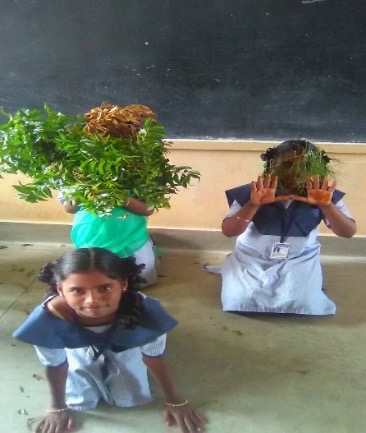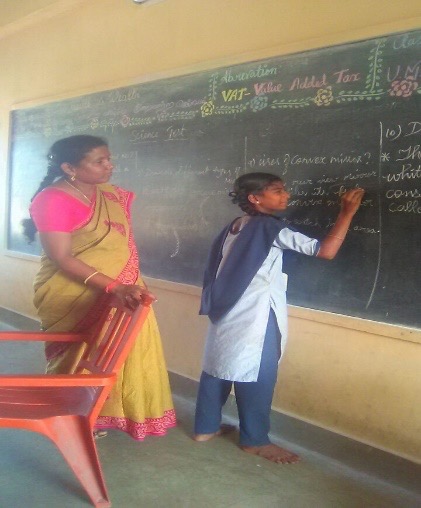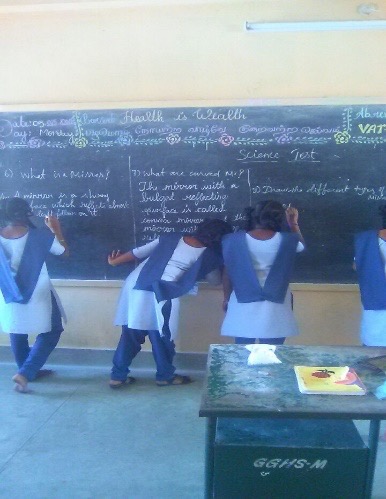Assessment is an indispensable part of teaching; it is a feedback mechanism to improvise one’s teaching methods and is a process to enhance learning. Assessments have to be done in a continuous manner and at regular intervals, going beyond the routine paper–pencil test. Contradictory to the existing practices that induce fear in students, different assessment methods can be enjoyable and engaging for the students.
I teach Science at the Government Girls High School in Maducarai, which is located 30 km west of Puducherry town. The school has a strength of 340 girls. My aim is to develop the interest of my students towards education. A bond between the teacher and the students is central for the students to develop such an interest, and dialogues prove to be a powerful medium for facilitating this bonding. I converse with my students on non-academic matters for five to ten minutes each day, wherein the students share their experiences while I talk about mine. We conduct activities where the students can showcase their talents for the whole class to appreciate. Sometimes, the students are awarded prizes as well.
Assessment in Education:
Assessment is fundamental to education, and it is inseparable from teaching. While formal modes of assessment, such as exams and tests, instil a lot of fear among the students, informal methods of assessment can be a powerful process for enhancing learning. I believe that assessment must be formative and continuous, rather than mundane and summative. When assessments are conducted in a continuous manner and at regular intervals, information such as the values and attitudes of students, their individual skills and conceptual understanding, come to the surface. In my class, I conduct non-threatening assessment methods, which bring out the students’ potential and makes the classroom an enjoyable learning space. This aids in increasing the self-esteem of the students and helps in developing their ability to think independently.
I believe assessment must be formative and continuous rather than mundane and summative.
I use the following techniques to assess my students:
- Dialogues and observations
- Projects
- Role-plays
- Simple experiments
- Tests/exams
- Board Test
Role-play as a Mode of Assessment:
Role-play is one of the modes of assessment that I employ to evaluate my students. This method is mostly suitable for teaching topics related to ecology, environmental science, or global issues. It proved very useful in developing a broader scientific perspective among the students. The students come up with their own scripts; it is an opportunity for them to showcase their originality. This automatically reduces the tendency to copy from others; it helps in the reduction of malpractices during assessments. The advantages of role-plays are listed below:
- It ensures participation of the entire class.
- It promotes the ability of students to work in groups, thereby enhancing their skills in planning, working in a team, etc.
- It enhances the ability of the students to think, especially in areas like concept-planning, script-writing, narration, etc.
- It increase the interest of the students towards the subject, and the class becomes more fun, enjoyable, engaging, and different.
- It facilitates in providing instant feedback and appreciation to the students.
Advantages of Role-play as a Mode of Assessment:


Students demonstrating global warming and its effects through role-play
When role-play was used as an assessment technique, all the students actively participated in it. The students enacted global warming and its effects through a role-play. Some students squeezed under a blue bedsheet to signify the seas. Some squeezed themselves under a white sheet to form ice caps. The students demonstrated the melting of ice caps by going flat under the white sheet and the rising of the sea levels by rising inside the blue sheet. This expressed their creativity and their understanding of global warming. When I conducted the role-play, a mentally retarded child in class, who is usually disengaged from the classroom activities, came to the stage and participated along with the other students. I was able to identify and assess the skills of each child (curricular as well as co-curricular skills).
Board test as an Assessment Tool:
Another assessment technique I have employed in my class is the board test. For this, the board was split into four parts, and the students were directed to write the answers for the questions that they had come prepared for. The bright students were usually the ones to volunteer first for writing the answers. With some extra preparation time and motivation, the average learners came next to write the answers on the board. The weak students were given some more time, and they were given simpler questions to study and answer. Every student felt happy that they were able to write on the board. As a teacher, this activity also helped me in doing a spot assessment of the students.


Reflections:
Teachers should be capable of adopting many new techniques in the classroom. Through these, we will be able to do wonders in the classroom. Now that 40% marks is allotted for formative assessment, it makes me happy that I can design assessments creatively. Student assessments also serve as a feedback to us on our teaching practices. It reveals to us which teaching methods work for our students and which ones need to improve. A proper assessment serves as a tonic for the students. We cannot expect immediate results. However, we are working for social transformation through teaching, and, hence, we have to be patient. My students now feel free to express their opinions and clarify their doubts in my class. They enjoy and feel happy to learn science. ■
Teacher: Akila. M, GGHS Maducarai